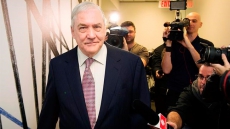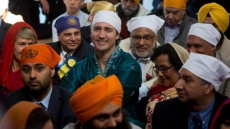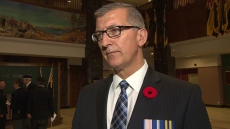TORONTO — Convicted theatre impresario Garth Drabinsky argues he was "denied natural justice" when a decision was made to strip him of his Order of Canada, an honour he is fighting to reclaim.
His lawyer will be in a Toronto court on Thursday, appealing a decision which dismissed Drabinsky's application for judicial review in which he had asked the Order of Canada advisory council's decision to be declared unlawful.
"Mr. Drabinsky's convictions were treated as determinative of whether he ought to be removed from the Order of Canada," his lawyer argued in documents filed with the Federal Court of Appeal.
"As Mr. Drabinsky noted in his unchallenged evidence, there are several members and officers of the Order of Canada who have not had their appointments terminated following a criminal conviction," he added, citing disgraced sprinter Ben Johnson as an example.
Drabinsky was made an officer of the Order of Canada in 1995. The honour recognizes outstanding achievement, dedication and service to the country.
In 2009, Drabinsky and his business partner Myron Gottlieb were convicted in a book-cooking scheme that led to the bankruptcy of their publicly traded company, which was behind hits such as "Phantom of the Opera'' and "Ragtime.''
A criminal conviction does not mean automatic removal from the order.
But Drabinsky — who was granted full parole earlier this year — was stripped of the honour in November 2012 while he was serving his prison sentence in a process his lawyer argues was unfair.
A federal court judge found in January, however, that there was "no basis'' for allowing Drabinsky's judicial review application proceed, and that the Order of Canada advisory council, its secretary general and the Governor General — who administers the honour — treated Drabinsky fairly.
In his latest round of legal battles, Drabinsky is now requesting his appeal be granted and the Order of Canada advisory council be directed to receive further submissions on whether his appointment to the order should be terminated and that it consider those submissions before making any recommendation to the Governor General.
Lawyers for the advisory council argue that the decision to terminate Drabinsky's membership in the order should stand and his appeal should be dismissed.
"The appellant has not demonstrated a breach of legitimate expectations," they argued in documents filed with the court.
"The application judge correctly found that 'since no Canadian citizen can claim a 'right' to an honour...a decision to grant, or not to confer, or even to withdraw an honorary appointment does not affect a person's rights, and cannot be challenged in court.'"
The advisory council's handling of Drabinsky's removal of the order is at the heart of his appeal.
Drabinsky is asking the appeal court to consider, among other things, whether the judge hearing his original application erred in holding that where criminal convictions are cited, the advisory council acts solely on the basis of those convictions while considering a limited range of other evidence.
The appeal court is also being asked to consider whether the earlier judge erred by not appropriately considering the advisory council's alleged "failure to make its recommendation 'based on evidence and guided by the principle of fairness.'"
Lawyers for the advisory council have countered, however, that the earlier judge did not make a mistake.
"The advisory council is not an administrative decision maker. It's role is to provide advice and recommendations to the Governor General concerning his exercise of the honours prerogative," they said. "Any duty to state its findings is owed to the Governor General alone."
The council wrote to Drabinsky in the summer of 2012 saying they were considering removing him from the order and asked him for submissions, but he said he couldn't access all necessary documents since he was still incarcerated.
Drabinsky's lawyers asked for an extension until January, 2013, when Drabinsky expected to be out on day parole and in a better position to assemble the materials he wanted to provide. The council granted him a one-month extension.
Lawyers for the council noted that Drabinsky sent in a 17-page letter and "extensive documentation" including a copy of his autobiography, as well as more than fifty letters of support.





